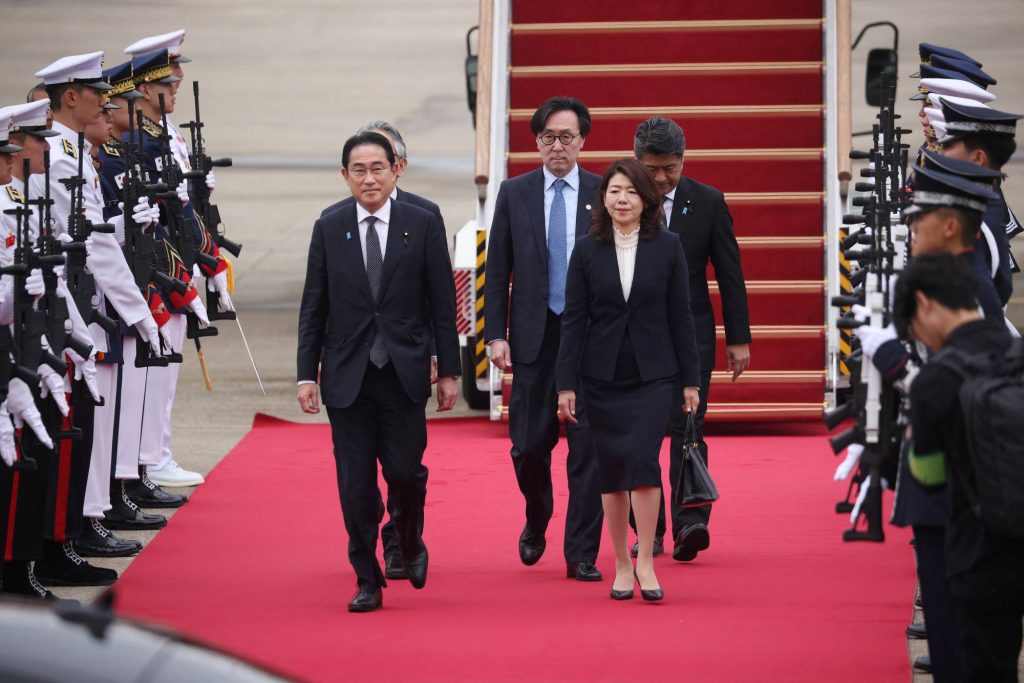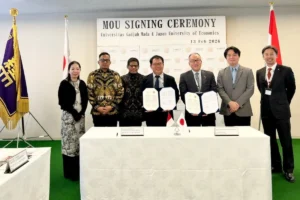Kishida arrives in South Korea for talks with Yoon

Seoul, The Gulf Observer: Prime Minister Fumio Kishida arrived in Seoul on Sunday for talks with South Korean President Yoon Suk-yeol, becoming the first Japanese leader to visit the country in more than five years, as the two look to bolster bilateral ties and restart “shuttle diplomacy” amid the growing North Korea nuclear threat.
Kishida arrived at Seoul Air Base in Seongnam on the outskirts of the South Korean capital and was set to visit Seoul National Cemetery, where South Korean veterans and four former presidents are buried, in the afternoon. Afterward, he was due to meet with Japanese business leaders in South Korea, followed by bilateral talks with Yoon scheduled to last 90 minutes. A joint news conference was scheduled for the evening.
Kishida’s trip is the first since 2018, when then-Prime Minister Shinzo Abe met Yoon’s predecessor, President Moon Jae-in, before the opening ceremony of the Pyeongchang Winter Olympics.
But it was also the first concrete signal that shuttle diplomacy — where the two countries’ leaders regularly visit each other’s country — has been re-established. The practice had been effectively halted since then-Prime Minister Yoshihiko Noda made the trek to Seoul in October 2011.
Kishida’s visit comes after years of acrimony between Tokyo and Seoul over wartime history and other issues dragged the relationship to new lows.
Observers have said that the ball is now in Kishida’s court to help improve relations, after Yoon made the trek to Tokyo in March, with the two sides hailing their summit as a breakthrough step toward improving tattered ties.
Yoon’s visit came just 10 days after he unveiled a proposed solution to the wartime labor issue, which envisions that a South Korean government-backed foundation will pay compensation to plaintiffs who won lawsuits over their alleged forced labor, instead of the Japanese firms that have been sued.
Kishida and Yoon were slated to discuss a raft of issues, including security cooperation amid North Korea’s unprecedented spate of missile tests and exercises. The historical issues, and progress in improving bilateral ties were also likely to be discussed.
Kishida’s visit comes as North Korea continues to refine its nuclear capabilities, including missiles capable of delivering atomic bombs to South Korea, Japan and even the entire United States.
Starting last year, the North began conducting missile and weapons tests at an unprecedented clip that continues to this day, helping nudge South Korea and Japan closer in the security realm and giving them common ground on which to base ties and ultimately help to resolve their relationship’s more intractable issues.
Beyond North Korea, the two leaders were also expected to discuss tie-ups in the science and technology fields, as well as cooperation in culture and youth sectors.
“I would like to frankly exchange views based on trust” with Yoon on a variety of topics, including issues surrounding wartime labor disputes, Kishida told reporters before leaving Tokyo for Seoul in the morning.
Given the resumption of dialogue between the Japanese and South Korean governments in several areas, including economics and security, Kishida said that the two sides would strive “to continue making efforts to develop these trends.”
The Japanese leader last week said his two-day visit to Seoul from Sunday would be an opportunity “to add momentum” to revitalizing shuttle diplomacy, but offered few other details about the goals of the trip.
Kishida is likely to point to the resumption of shuttle diplomacy and improving ties with Seoul as the latest in a series of diplomatic wins in recent months that have buoyed his approval rating.
One recent poll by the Nikkei business daily even put Kishida’s support rate above 50% for the first time in eight months, fueling speculation he could call a snap election to shore up his mandate. The prime minister does not need to call a general election until 2025.
But the prime minister will also have to ameliorate concerns within the conservative wing of his ruling Liberal Democratic Party, which has taken a hard line on dealings with South Korea. Those LDP members have viewed Kishida’s attempt at rapprochement with unease, fearing he could offer up further concessions despite Seoul’s history of backtracking on deals, including a 2015 “comfort women” agreement that was intended to “finally and irreversibly” resolve the issue.
The term “comfort women” is a euphemism for those who suffered under Japan’s military brothel system before and during World War II.
Yoon, meanwhile, will be hoping for at least something to take back to the public, possibly a gesture from Kishida reiterating that Tokyo stands by its 1998 joint declaration with South Korea that saw then-Prime Minister Keizo Obuchi offer “deep remorse and a heartfelt apology” over Japan’s wartime aggression.
Kishida said that Japan stood by these past statements during the March summit in Tokyo with Yoon, but did not offer a fresh apology. Yoon, for his part, has said one is not necessary, telling The Washington Post in an April interview that he cannot accept the notion that Japan “must kneel (for forgiveness) because of our history 100 years ago.”
The pair were scheduled to have dinner later Sunday evening. On Monday, Kishida will greet members of the Japan-South Korea parliamentary league followed by a meeting with South Korean business and trade representatives.
While Kishida’s trip is important, it won’t be his only chance to address these issues this month as the prime minister has invited Yoon to join the Group of Seven summit as a guest in Hiroshima from May 19-21.


